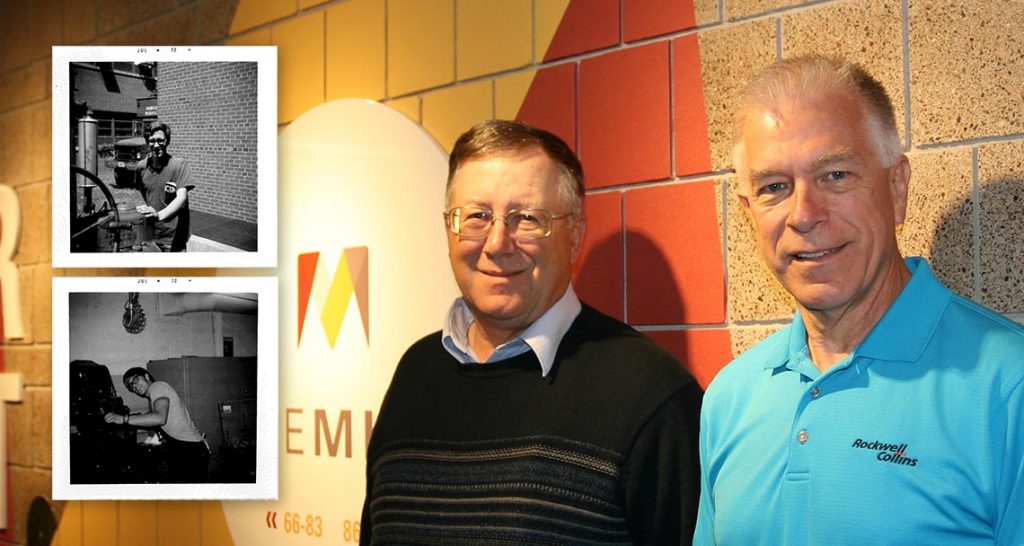
Two Cyclone engineers. More than 200 patents. A hands-on Iowa State learning experience that started it all.
Steve Koenck (elec engr ‘73, MS ’74) and Joe Musil (mech engr ’72) met as Iowa State engineering students in 1970 when they both were working in the College of Engineering’s fabrication machine shop.
“Pretty much every hour I wasn’t in class, I was in the shop in Coover Hall,” said Koenck. “We got to help every step of the way as the shop technicians created one-of-a-kind research equipment for faculty members – anything from custom instruments to setting up whole new labs.”
Along the way, Koenck, Musil and the other student workers got unique practice in the design and build cycle from beginning to end.
“Researchers would come in with an idea brilliantly in their minds, and we learned how to take those idea and turn them into a design on paper,” said Musil. “Then we’d set to fabricating using lathes, milling and welding, so we could come up with a prototype for the researcher to test.”
Both Koenck and Musil grew up working on Iowa farms, building early hands-on problem solving skills. And both say working in Iowa State’s fabrication shop gave them further experience that set them apart from other engineers.
“We knew how to run every machine in the shop, and we got to see what we learned in class come to life,” said Musil, “When I got a job, they were astounded to learn how much I knew about how to design, machine, and weld.”
Beyond technical skills, working in the shop instilled a powerful spirit of innovation and problem solving.
“The shop manager, Terry McConnell, had a motto of ‘we can do anything.’ Didn’t matter what it was, we can engineer and create it,” said Koenck. “So, we went into the work world with that idea in our heads.”
Industry impact
From Iowa State, Musil joined Iowa Manufacturing Company, a Raytheon owned company, in Cedar Rapids, engineering heavy machinery.
“With my experience at Iowa State, I was able to go in and start solving problems right away,” said Musil.
Over the years, he’s designed and created huge, complex heavy machines from “one end to the other.” He developed rock crushing equipment, asphalt plants and pavers, air filtration equipment and more.
“I had the luck to start working in heavy equipment in 1972, the year the Environmental Protection Agency was formed. Our industry worked hand-in-hand with the EPA on a large varities of issues on regulations, test protocols, tests and controls,” said Musil. “Changing regulatory conditions meant an opportunity to create a lot of new ideas and technologies.”
And create he certainly did: He holds 64 patents for new technologies and processes he’s invented (with more applications in progress). And he’s a member of the Iowa Intellectual Property Law Association’s Iowa Inventors Hall of Fame.
Koenck made an equally large innovation impact during his career in the electronics and aerospace industry. He worked most of his career at Norand Corporation and Rockwell Collins, where he engineered components for commercial, aerospace and defense systems.
“The work was consistently between interesting and fascinating,” said Koenck. “I had real opportunities to attack significant problems that changed the industry.”
One of those industry-changers is at the top of your cell phone or laptop display right now: the highly accurate fuel gauge that tells us just how much battery charge remains. At Norand Corporation, Koenck created this “smart battery” technology that combines batteries and computer chips to monitor and regulate battery conditions.
And that’s just one of his 150 patents (so far). Koenck is also a member of Iowa’s Inventors Hall of Fame.
Inventive education
Koenck recently retired and moved to Ankeny, Iowa. Musil farms 240 acres near Ely, Iowa, and continues to work “in town.”
They have kept in touch over the years, meeting up to talk about their work and reminisce about their time at Iowa State.
“It’s interesting that both Joe and I have made a lot of inventions in our professional life, and I always wonder what the common thread is,” said Koenck. “Was it being in the shop? Was it the technical knowledge in our classes?”
Musil would say that both were key to their success.
“I always say Steve and I came out of the College of Engineering with two degrees. One in our technical engineering area. And one in how everything else really works in the engineering world: how run everything in the shop, how to make anything, how to talk to people and come up with designs,” he said.
Koenk agrees. “Part of being an inventor is just really wanting to invent, but the other parts are technical know-how and hands-on experience. I credit Iowa State as the place that delivered a high quality education that made it possible for me to invent and make an impact as an engineer.”
